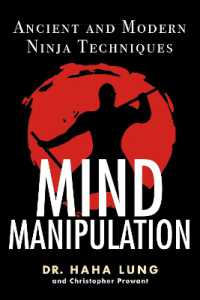- ホーム
- > 洋書
- > 英文書
- > Literary Criticism
Full Description
This book considers one of the most controversial aspects of children's and young adult literature: its use as an instrument of power. Children in contemporary Western society are oppressed and powerless, yet they are allowed, in fiction written by adults for the enlightenment and enjoyment of children, to become strong, brave, rich, powerful, and independent -- on certain conditions and for a limited time. Though the best children's literature offers readers the potential to challenge the authority of adults, many authors use artistic means such as the narrative voice and the subject position to manipulate the child reader. Looking at key works from the eighteenth century to the present, Nikolajeva explores topics such as genre, gender, crossvocalization, species, and picturebook images. Contemporary power theories including social and cultural studies, carnival theory, feminism, postcolonial and queer studies, and narratology are also considered, in order to demonstrate how a balance is maintained between the two opposite inherent goals of children's literature: to empower and to educate the child.
Contents
Series Editor's Foreword Acknowledgments Introduction: Why Does Pippi Sleep with Her Feet on the Pillow? 1: Harry Potter and the Secrets of Children's Literature 2: Othering the Sense: Language and (Mis)communication 3: Othering the Genre: Fantasy and Realism 4: Othering the Child: George MacDonald's Fairy Tales 5: Othering the Future: Stereotypes of Dystopia 6: Othering the Setting: Orientalism and Robinsonade 7: Othering Gender: New Masculinities, New Femininities 8: Othering Voice: Crossvocalization and Performance 9: Othering Ideology: Literature in Society's Service 10: Othering the Species: The (Ab)use of Animals 11: Othering the Visual: Power Structures in Picturebooks 12: Othering the Reader: Identification Fallacy Conclusion: The Adult's Self-Denial Bibliography Index







